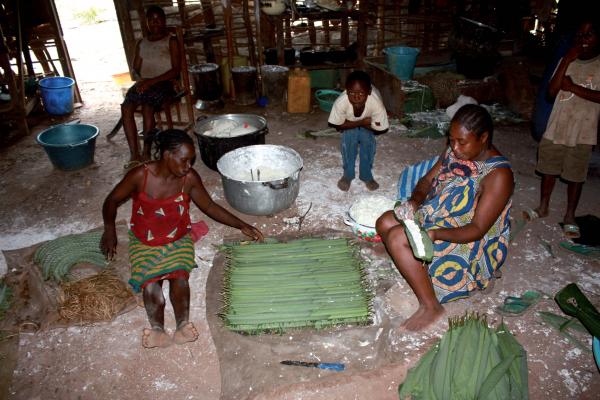
Agroforestry systems in Central Africa
How can we develop sustainable, high-yielding agroforestry systems that satisfy demand from the agricultural sector, particularly family farms?

Often called the “granary” of central Africa, Cameroon alone accounts for 70% of intra-community trade in the Central African Economic and Monetary Community (CEMAC). With a GDP of USD 39 billion in 2019, the primary sector accounts for 22% of national wealth and over 50% of non-oil export earnings. The farming sector is the country’s largest employer, with more than 40% of the working population (total population estimated at almost 27 million in 2021).
Cameroon’s agricultural economy is diversified, in line with the considerable agro-ecological diversity of the country: from tubers, roots, plantains, fruits and vegetables in the South and West, to millet, sorghum, rice and livestock products in the North. However, national agricultural production falls short of the basic food needs of the growing urban population, and imports of certain staples (maize, rice, wheat, sugar, meat, fish, milk and refined oils) are regularly increasing. Cash crops play a major role in the country’s economy, particularly bananas, cocoa, coffee, oil palm, rubber and cotton. Lastly, the timber value chain is one of the pillars of the national economy accounting for 5% of GDP and 30% of national non‑oil export resources.
Sustainable management of forest ecosystems, by studying forest dynamics and structure, timber traceability and various forest governance instruments, is a priority line of work involving researchers, concession holders and forestry services. Agroforestry systems based on coffee, and especially cocoa, are another major focus of studies based on agroecology principles combining pest control, use of high-yielding planting material, and the strengthening of innovation services and tools for sustainable crops and the well-being of local populations. This approach also applies to research projects designed to develop major agricultural value chains: plantain, cassava, yam, dessert banana, but also cotton and other crops.
Another priority line of research includes preventing the emergence of zoonotic diseases, taking a One Health approach (for humans, animals and the environment).
Researcher training, institutional capacity building and agricultural advisory services are all relevant to the above-mentioned fields of study.
French Cooperation has been historically very active in Cameroon’s agricultural development. It provides assistance to national programmes, promotes the pooling of resources at national and international levels, and supports the research sector (Debt Reduction and Development Contract - C2D).
For this aspect, CIRAD devotes its efforts to two research and training platforms in partnership (dP) on central African forests and agroforestry systems in Cameroon.

How can we develop sustainable, high-yielding agroforestry systems that satisfy demand from the agricultural sector, particularly family farms?

How can we improve polices, strategies and modes of intervention on every level so as to ensure the long-term preservation of the Congo Basin forests and food security for the people who derive a living from them?
The new project: "Driving agroecological transitions in the Central and Eastern African humid tropics through transdisciplinary agroecology living laboratories" is implemented in Cameroon and the Democratic Republic of Congo.
For more information: Presentation of the CANALLS project on the European Commission website